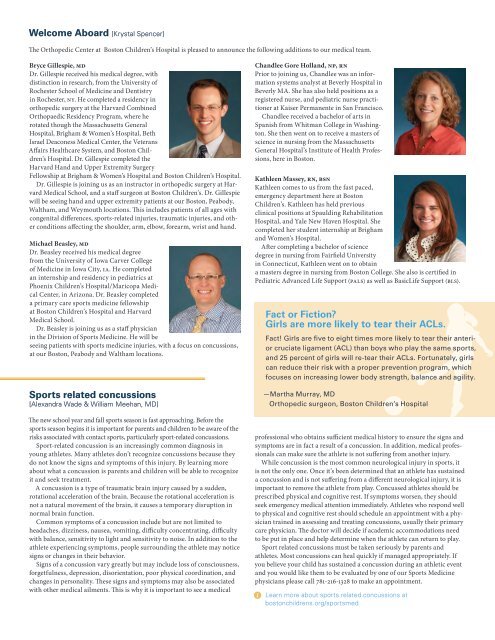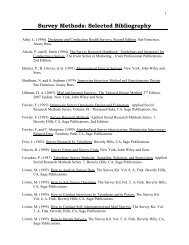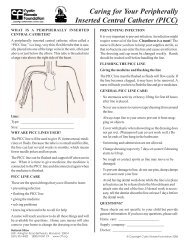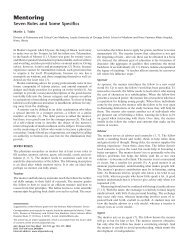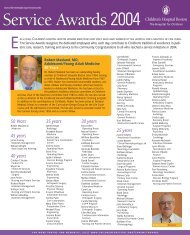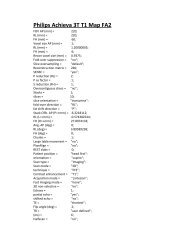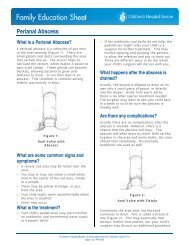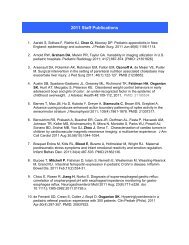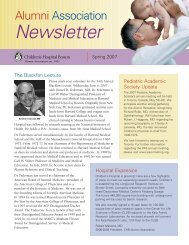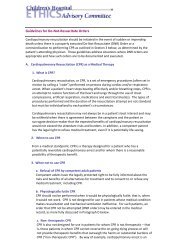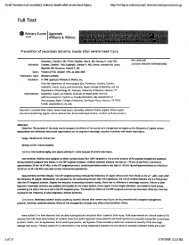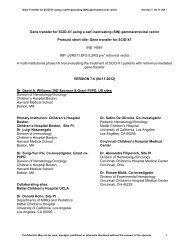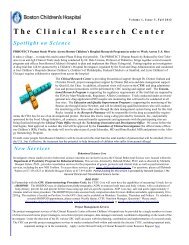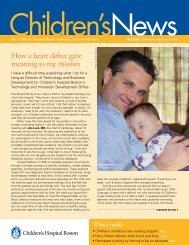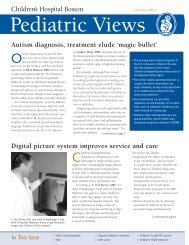Ortho Times Vol 24 - Children's Hospital Boston
Ortho Times Vol 24 - Children's Hospital Boston
Ortho Times Vol 24 - Children's Hospital Boston
You also want an ePaper? Increase the reach of your titles
YUMPU automatically turns print PDFs into web optimized ePapers that Google loves.
Welcome Aboard [Krystal Spencer]<br />
The <strong>Ortho</strong>pedic Center at <strong>Boston</strong> Children’s <strong>Hospital</strong> is pleased to announce the following additions to our medical team.<br />
Bryce Gillespie, MD<br />
Dr. Gillespie received his medical degree, with<br />
distinction in research, from the University of<br />
Rochester School of Medicine and Dentistry<br />
in Rochester, NY. He completed a residency in<br />
orthopedic surgery at the Harvard Combined<br />
<strong>Ortho</strong>paedic Residency Program, where he<br />
rotated though the Massachusetts General<br />
<strong>Hospital</strong>, Brigham & Women’s <strong>Hospital</strong>, Beth<br />
Israel Deaconess Medical Center, the Veterans<br />
Affairs Healthcare System, and <strong>Boston</strong> Children’s<br />
<strong>Hospital</strong>. Dr. Gillespie completed the<br />
Harvard Hand and Upper Extremity Surgery<br />
Fellowship at Brigham & Women’s <strong>Hospital</strong> and <strong>Boston</strong> Children’s <strong>Hospital</strong>.<br />
Dr. Gillespie is joining us as an instructor in orthopedic surgery at Harvard<br />
Medical School, and a staff surgeon at <strong>Boston</strong> Children’s. Dr. Gillespie<br />
will be seeing hand and upper extremity patients at our <strong>Boston</strong>, Peabody,<br />
Waltham, and Weymouth locations. This includes patients of all ages with<br />
congenital differences, sports-related injuries, traumatic injuries, and other<br />
conditions affecting the shoulder, arm, elbow, forearm, wrist and hand.<br />
Michael Beasley, MD<br />
Dr. Beasley received his medical degree<br />
from the University of Iowa Carver College<br />
of Medicine in Iowa City, IA. He completed<br />
an internship and residency in pediatrics at<br />
Phoenix Children’s <strong>Hospital</strong>/Maricopa Medical<br />
Center, in Arizona. Dr. Beasley completed<br />
a primary care sports medicine fellowship<br />
at <strong>Boston</strong> Children’s <strong>Hospital</strong> and Harvard<br />
Medical School.<br />
Dr. Beasley is joining us as a staff physician<br />
in the Division of Sports Medicine. He will be<br />
seeing patients with sports medicine injuries, with a focus on concussions,<br />
at our <strong>Boston</strong>, Peabody and Waltham locations.<br />
Sports related concussions<br />
[Alexandra Wade & William Meehan, MD]<br />
The new school year and fall sports season is fast approaching. Before the<br />
sports season begins it is important for parents and children to be aware of the<br />
risks associated with contact sports, particularly sport-related concussions.<br />
Sport-related concussion is an increasingly common diagnosis in<br />
young athletes. Many athletes don’t recognize concussions because they<br />
do not know the signs and symptoms of this injury. By learning more<br />
about what a concussion is parents and children will be able to recognize<br />
it and seek treatment.<br />
A concussion is a type of traumatic brain injury caused by a sudden,<br />
rotational acceleration of the brain. Because the rotational acceleration is<br />
not a natural movement of the brain, it causes a temporary disruption in<br />
normal brain function.<br />
Common symptoms of a concussion include but are not limited to<br />
headaches, dizziness, nausea, vomiting, difficulty concentrating, difficulty<br />
with balance, sensitivity to light and sensitivity to noise. In addition to the<br />
athlete experiencing symptoms, people surrounding the athlete may notice<br />
signs or changes in their behavior.<br />
Signs of a concussion vary greatly but may include loss of consciousness,<br />
forgetfulness, depression, disorientation, poor physical coordination, and<br />
changes in personality. These signs and symptoms may also be associated<br />
with other medical ailments. This is why it is important to see a medical<br />
Chandlee Gore Holland, NP, RN<br />
Prior to joining us, Chandlee was an information<br />
systems analyst at Beverly <strong>Hospital</strong> in<br />
Beverly MA. She has also held positions as a<br />
registered nurse, and pediatric nurse practitioner<br />
at Kaiser Permanente in San Francisco.<br />
Chandlee received a bachelor of arts in<br />
Spanish from Whitman College in Washington.<br />
She then went on to receive a masters of<br />
science in nursing from the Massachusetts<br />
General <strong>Hospital</strong>’s Institute of Health Professions,<br />
here in <strong>Boston</strong>.<br />
Kathleen Massey, RN, BSN<br />
Kathleen comes to us from the fast paced,<br />
emergency department here at <strong>Boston</strong><br />
Children’s. Kathleen has held previous<br />
clinical positions at Spaulding Rehabilitation<br />
<strong>Hospital</strong>, and Yale New Haven <strong>Hospital</strong>. She<br />
completed her student internship at Brigham<br />
and Women’s <strong>Hospital</strong>.<br />
After completing a bachelor of science<br />
degree in nursing from Fairfield University<br />
in Connecticut, Kathleen went on to obtain<br />
a masters degree in nursing from <strong>Boston</strong> College. She also is certified in<br />
Pediatric Advanced Life Support (PALS) as well as BasicLife Support (BLS).<br />
Fact or Fiction?<br />
Girls are more likely to tear their ACLs.<br />
Fact! Girls are five to eight times more likely to tear their anterior<br />
cruciate ligament (ACL) than boys who play the same sports,<br />
and 25 percent of girls will re-tear their ACLs. Fortunately, girls<br />
can reduce their risk with a proper prevention program, which<br />
focuses on increasing lower body strength, balance and agility.<br />
—Martha Murray, MD<br />
<strong>Ortho</strong>pedic surgeon, <strong>Boston</strong> Children’s <strong>Hospital</strong><br />
professional who obtains sufficient medical history to ensure the signs and<br />
symptoms are in fact a result of a concussion. In addition, medical professionals<br />
can make sure the athlete is not suffering from another injury.<br />
While concussion is the most common neurological injury in sports, it<br />
is not the only one. Once it’s been determined that an athlete has sustained<br />
a concussion and is not suffering from a different neurological injury, it is<br />
important to remove the athlete from play. Concussed athletes should be<br />
prescribed physical and cognitive rest. If symptoms worsen, they should<br />
seek emergency medical attention immediately. Athletes who respond well<br />
to physical and cognitive rest should schedule an appointment with a physician<br />
trained in assessing and treating concussions, usually their primary<br />
care physician. The doctor will decide if academic accommodations need<br />
to be put in place and help determine when the athlete can return to play.<br />
Sport related concussions must be taken seriously by parents and<br />
athletes. Most concussions can heal quickly if managed appropriately. If<br />
you believe your child has sustained a concussion during an athletic event<br />
and you would like them to be evaluated by one of our Sports Medicine<br />
physicians please call 781-216-1328 to make an appointment.<br />
Learn more about sports related concussions at<br />
bostonchildrens.org/sportsmed


